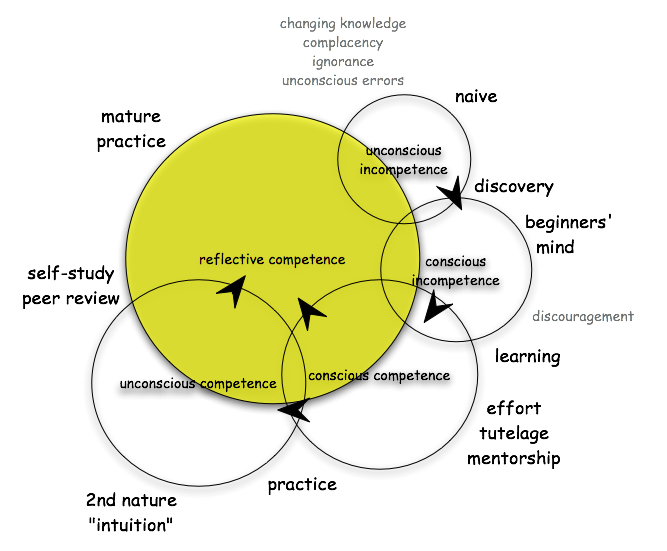9.3 Cultivating a commitment to being Reflective

Boud (2001) reinforces the benefit of reflection in a social context for educators: These reflective processes can be undertaken in isolation from others, but doing so often leads to a reinforcement of existing views and perceptions. Working in pairs or with a group for which learning is reason for being can begin to transform perspectives and challenge old patterns of learning. It is only through a give and take with others and by confronting the challenges they pose that critical reflection can be promoted.
As educators embark on the practice of reflection the elements that Taylor (2007) describes supports the process of reflection and creates concreteness to what for some might feel quite abstract. The notion of reflecting individually, with a critical friend or mentor is noted as the educator moves through the stage of conscious competence. Rather than becoming complacent or habitual, Taylor (2007) suggests moving into reflective consciousness which he describes as mature practice. Skattebol (2010), suggests “engagement in this type of reflection propels educators to examine the dimensions of the teaching or learning that popular discourse regards as interior, and how non-conscious (often collective) habits operate in tandem with our conscious and cognitively driven interactions” (p.89).

This context of reflection takes our thinking from a habit to an intention or reflective consciousness and this is the essence of reflective practice.
Dig Deeper
For more information on this topic check out the resource links below:
- Communities of Practice ( The College of ECE)
- Frontiers | Reflective Practice: A Method to Improve Teachers’ Well-Being. A Longitudinal Training in Early Childhood Education and Care Centers | Psychology ( Research Article)
- Creating Conditions for Reflective Practice in Early Childhood Education ( Journal Article)
- Key Concept: Learning Communities
Sources
Boud, D. (2001). Using journal writing to enhance reflective practice. New Directions for Adult and Continuing Education, 90, 9-17. https://doi.org/10.1002/ace.16
Skattebol, J. (2010). Affect: a tool to support pedagogical change. Discourse: Studies in the Cultural Politics of Education, 31(1), 75-91. https://doi.org/10.1080/01596300903465435
Taylor, E. (2007). An update of transformative learning theory: a critical review of the empirical research (1999–2005) International Journal of Lifelong Education, 26(2), 173-191. https://doi.org/10.1080/02601370701219475
Third, S. (2015). The effects of regular reflective writing on early childhood educators effectiveness in the workplace [Unpublished paper] Masters of Arts – Integrated Studies, Athabasca University.

